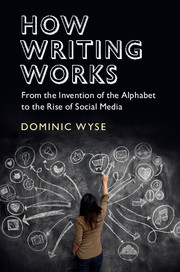Book contents
- How Writing Works
- How Writing Works
- Copyright page
- Dedication
- Contents
- Figures and Tables
- Acknowledgements
- Introduction
- 1 Thinking about Writing and Language
- 2 A History of Writing
- 3 Writing Guidance
- 4 Expert Writers
- 5 Creativity and Writing
- 6 Novice Writers and Education
- 7 The Process of Writing
- Bibliography
- Index
4 - Expert Writers
Published online by Cambridge University Press: 12 December 2017
- How Writing Works
- How Writing Works
- Copyright page
- Dedication
- Contents
- Figures and Tables
- Acknowledgements
- Introduction
- 1 Thinking about Writing and Language
- 2 A History of Writing
- 3 Writing Guidance
- 4 Expert Writers
- 5 Creativity and Writing
- 6 Novice Writers and Education
- 7 The Process of Writing
- Bibliography
- Index
Summary
The writers whose work is the focus for this chapter not only have wide recognition, and for most the winning of major prizes such as the Nobel Prize for Literature, but have also been regarded by other writers, including critics, as some of the finest of their generation. Perhaps another way to describe these particular writers is, ‘writers’ writers’. In any field of human endeavour, we look to the most successful exponents of the art, science, or other domain for their reflections, knowledge, and understanding.
The primary data that underpinned the analysis for this chapter already existed in The Paris Review Interviews. The Paris Review Interviews are interviews with some of the world's great writers from the 1950s onwards. There are four printed volumes that are a selection of the best of 64 interviews taken from all interviews available prior to each volume. Subsequently, the resource continues to be added to online. As the editor Philip Gourevitch made the selections for the four printed volumes. The revealing insights, in the words of the very writers themselves, are in no small part due to the methodological approach taken by The Paris Review. The interviewers were themselves writers who had read their interviewee's works. The interviews, which were undertaken over one or more visits to the writers’ homes, sometimes over a period of years, were followed by writers being sent an edited transcript of the interview to review. Hence the benefits of the oral interview, with its revealing ‘on the spot’ requirement for answers, was balanced against the opportunity for the writers to reflect carefully on the transcript to ensure their answers were as close to their intended beliefs as possible. A unique feature of the interviews is that they focus on the processes of writing, the writer's craft, much more than the outputs of writing.
In addition to the formal interviews the Paris Review site also includes a wealth of current and contemporary accounts including its reports in The Daily. For example, an interview outside of the usual Paris Review interviews was with Karl Ove Knausgård whose writing was generating intense interest at the time.
- Type
- Chapter
- Information
- How Writing WorksFrom the Invention of the Alphabet to the Rise of Social Media, pp. 122 - 151Publisher: Cambridge University PressPrint publication year: 2017



